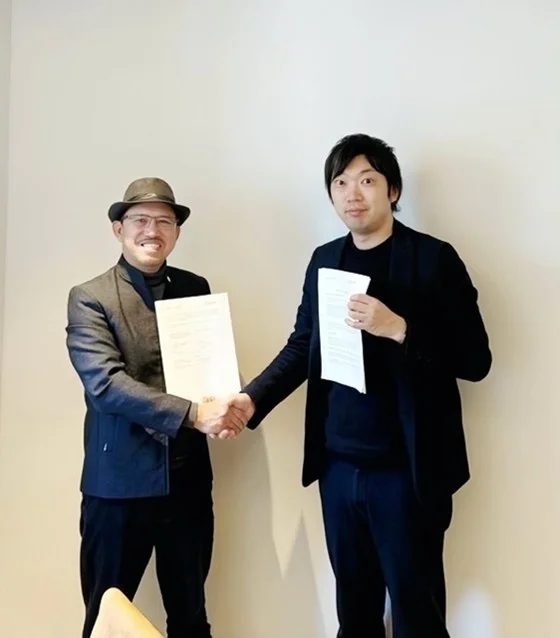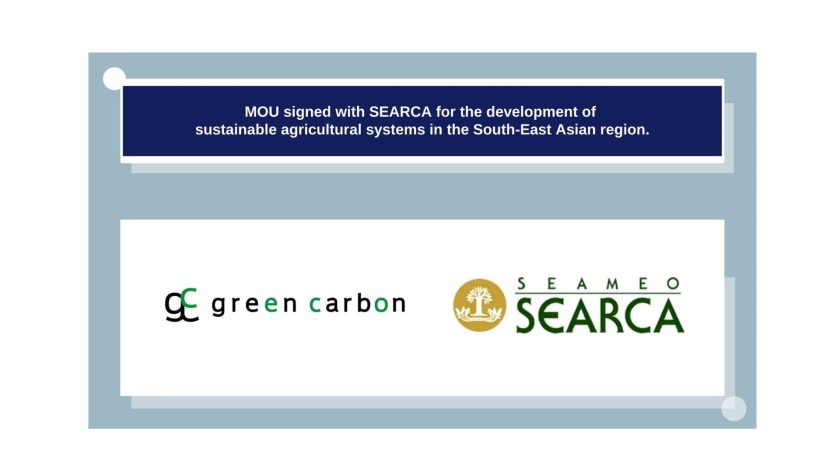Promoting Carbon Farming in Southeast Asian Countries and Creating Carbon Credits from Agriculture
Green Carbon,inc.(President: Jun Okita, hereinafter referred to as “Green Carbon”), which operates a nature-based carbon credit generation and sales business, is pleased to announce that it has signed a Memorandum of Understanding (MOU) with the Southeast Asian Regional Center for Graduate Study and Research in Agriculture (SEARCA ※1), an institution under the Southeast Asian Ministers of Education Organization (SEAMEO). The MOU aims to promote sustainable agriculture and generate agriculture-based carbon credits in the Southeast Asian region.
Under this MOU, the two parties will work together to promote the development of nature-based carbon credit projects, with a particular focus on carbon farming ※2—which enhances soil carbon sequestration—with the goal of generating carbon credits.
◆Background and Roles of This MOU
Green Carbon is engaged in the creation of nature-based carbon credits, mainly in Southeast Asia, and is developing a wide range of nature-based carbon credit creation projects, including forest conservation, paddy field and mangrove plantations, reduction of cow burping, and biochar projects. Green Carbon develops carbon credit generation projects that are suited to the characteristics of the natural resources in each region, and uses satellite data for site selection and monitoring to ensure efficient and highly transparent project management.
SEARCA is a non-profit organization founded in 1966 by SEAMEO, an intergovernmental organization in the Southeast Asian region. SEARCA provides graduate education in agriculture and partners with universities and research institutions in Southeast Asian countries to address agricultural issues in the region.
In cooperation with SEARCA, the MOU has been signed with the aim of promoting the creation of carbon credits from agriculture in the Southeast Asian region, while contributing to further decarbonization and increasing farmers’ benefits.
In this collaboration, SEARCA will support project design and development by leveraging its expertise and extensive network in the agricultural sector, and Green Carbon will lead the process of sharing knowledge, collecting and analyzing necessary data, and certifying and selling the carbon credits generated in compliance with international standards. Green Carbon will lead a series of processes from the sharing of knowledge for carbon credit creation in compliance with international standards, to the establishment of a system for collecting and analyzing the necessary data, to the certification and sale of the carbon credits created. The carbon credit scheme will be used as an incentive to promote the transition to a sustainable agricultural system.

○Photo from the MOU signing ceremony (Left: SEARCA Director Dr. Glenn B. Gregorio, Right: Green Carbon CEO Jun Okita)
◆Future Developments
Based on this collaboration, Green Carbon will focus on implementing carbon farming (an agricultural practice that promotes carbon sequestration in agricultural soil) in the Southeast Asia region. The GHG emissions from agricultural production in Southeast Asia in 2021 were 0.82 Gt, accounting for about 9% of global agriculture-related emissions ※3. The agricultural sector is an important source of emissions in Southeast Asia, but also has great potential for emission reductions through a shift to sustainable farming methods.
Green Carbon is developing a large-scale project to generate carbon credits from rice cultivation in Southeast Asian countries including Vietnam and the Philippines. Through this cooperation with SEARCA, Green Carbon will expand its efforts to agricultural areas other than rice production. Specifically, the project will focus on the introduction of cover crops (green manure ※4) and agroforestry (forestry farming ※5). Many small-scale farmers in Southeast Asian countries face challenges in transitioning to new farming methods due to short-term returns and dependence on existing farming systems. Green Carbon aims to achieve both decarbonization and economic benefits for farmers. In addition, Green Carbon will work to develop and disseminate soil carbon sequestration methods that combine various farmland improvement activities included in carbon farming, such as switching from chemical fertilizers to organic fertilizers and compost, introducing intercropping and crop rotation, and practicing no-till farming.
These methods not only contribute to emission reductions, but also improve soil health, conserve water resources, promote biodiversity, stabilize crop yields, and increase farmers’ income. In collaboration with SEARCA, which has expertise in this area, we will conduct demonstration tests of methods suitable for various soil and climatic conditions, and scientifically verify the combination that will have the highest decarbonization effect and benefit local farmers. By doing so, we will contribute to the spread of sustainable agriculture and expansion of carbon credit generation in the Southeast Asian region, thereby contributing to combating climate change and strengthening rural economies in the region.
※1: Southeast Asian Regional Center for Graduate Study and Research in Agriculture (SEARCA)
SEARCA was established in 1966 as a specialized agency of the Southeast Asia Education Ministers Organization (SEAMEO). Headquartered in Los Baños, Philippines, SEARCA conducts research, graduate education, and knowledge dissemination activities for sustainable agriculture and rural development in the Southeast Asian region. The Center aims to contribute to regional food security and rural development through higher education and research in the field of agriculture.
※2 :Carbon Farming
A general term for agricultural practices that promote carbon sequestration in farm soils. Through the reduction of chemical fertilizers and increased organic inputs, the introduction of intercropping and crop rotation, and the practice of no-till and minimum tillage farming, carbon dioxide from the atmosphere is fixed in the soil. This is expected to have a multifaceted effect of increasing agricultural productivity and environmental sustainability by reducing greenhouse gases, improving soil fertility, improving water retention capacity, and increasing biodiversity.
※3:GHG Emissions from the Agriculture Sector
【Reference】Asian Development Bank (2023)
※4:Cover Crops (Green Manure)
A cover crop is a crop that covers farmland outside the growing season of the main crop. They are intentionally grown to protect the soil and improve nutrition, primarily by preventing soil erosion, providing organic matter, and storing carbon. Legumes and grasses are often used, and they are also used as green manure that is not harvested but plowed into the soil.
※5:Agroforestry (Forest Farming)
Agroforestry is an agricultural system that combines trees with crops and livestock on the same land. It is a sustainable land use method that combines environmental conservation and agricultural production, increasing biodiversity, carbon sequestration, soil protection, and income diversification. It can take many forms, including mixed planting of fruit trees and crops, and integration of trees and livestock.
◆ Green Carbon, Inc.
Representative:Jun Okita, CEO
Location :Isal AKASAKA607, 5-2-33 Akasaka, Minato-ku, Tokyo
Establishment :December 2019
Business :Carbon credit creation and sales business, agriculture-related business, environment-related business, other related businesses and ESG consulting business
URL : https://green-carbon.co.jp/
◆ Business Introduction of Green Carbon
Green Carbon operates with the vision of “Saving the Earth with the Power of Life”, by providing comprehensive support for the creation, registration, and sales of carbon credits in domestic and international markets. We are also expanding our business operations in wider industries including agriculture, research & development, and ESG consulting.
Our operations are primarily based in Japan and Southeast Asia, while currently expanding business in Australia and South America. We create naturally derived carbon credits from sources including water paddies, biochar, forest conservation, carbon farming, mangrove plantation, and methane from cattle eructation. Our focus is on generating carbon credits through methane gas reduction in rice paddies, where we have obtained the first and largest certification for J-Credits in Japan (approximately 6,220 tons), and plan to expand to around 40,000 hectares (approximately 100,000 tons) in the fiscal year 2024. We also offer a service called “Agreen” that integrates credit registration, application, and sales into one platform, simplifying procedures such as application registration and document preparation, thus reducing workload for credit creators.
◆ Social Media for Green Carbon
Youtube :https://www.youtube.com/channel/UCYO4WnGOHDaVB1ikxheZasA
note :https://note.com/green_carbon/
Facebook:https://www.facebook.com/profile.php?id=61557429326458
X :https://mobile.x.com/GreenCarbon2019
LinkedIn :https://www.linkedin.com/company/green-carbon-inc/

